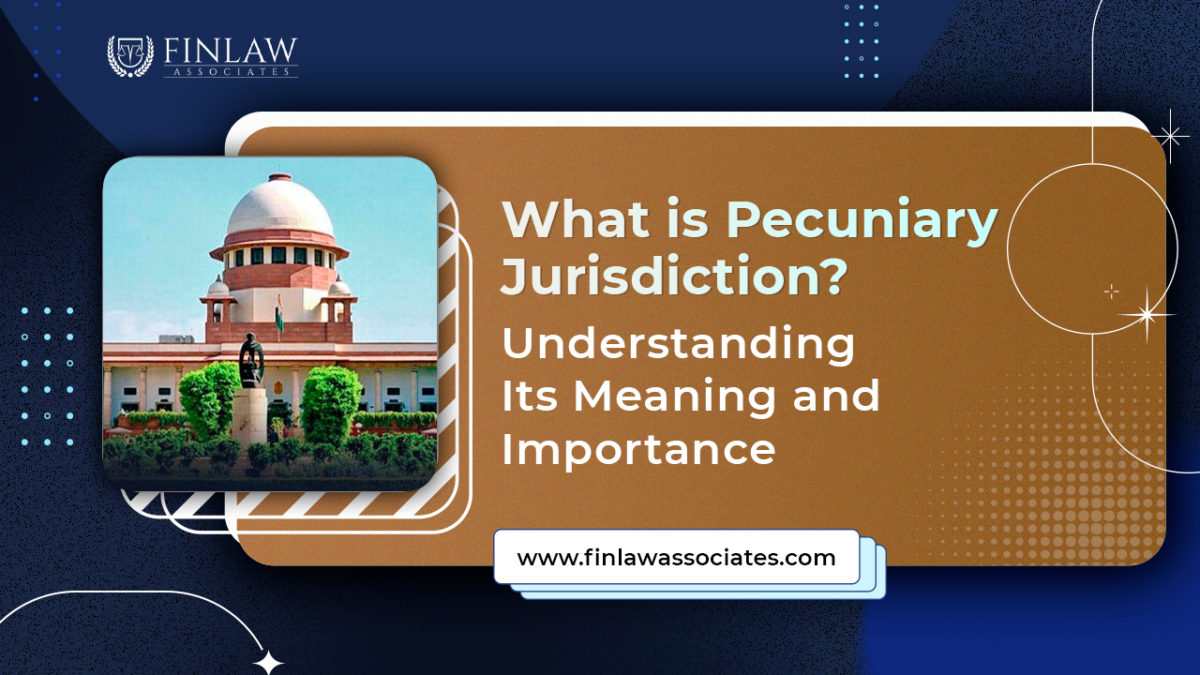
The Role of Patent Law in Cybersecurity Startups and Tech Firms
April 21, 2025
Who Can Sue for Infringement of Trademark: A Legal Perspective in India
May 12, 2025
In the intricate framework of India's judicial system, the concept of jurisdiction determines the authority of courts to hear and decide cases. Among the various types of jurisdiction, pecuniary jurisdiction plays a pivotal role, especially in civil litigation. This article delves deep into the meaning, significance, practical implications, and recent developments of pecuniary jurisdiction within the Indian legal context. It is essential reading for anyone seeking clarity on what is pecuniary jurisdiction in India and its implications in civil court proceedings.
What is Pecuniary Jurisdiction?
Pecuniary jurisdiction refers to the monetary limits within which a court can entertain and adjudicate civil suits. Essentially, it determines the value of the subject matter that a particular court is authorized to handle.
This classification ensures that cases are distributed among courts based on the financial stakes involved, promoting efficiency and preventing the overburdening of higher courts. Understanding what is pecuniary jurisdiction is especially important for litigants, lawyers, and judicial authorities to ensure legal proceedings are initiated in the correct forum.
The monetary threshold may vary based on state legislation, which means pecuniary jurisdiction in India is not uniformly set across the nation.
Legal Framework Governing Pecuniary Jurisdiction
The primary statutes governing pecuniary jurisdiction in India are:
- Section 6 of the Civil Procedure Code (CPC), 1908: This section stipulates that no court shall entertain suits beyond its pecuniary limits. It ensures that a court does not overstep its financial authority.
- Section 15 of the CPC: It mandates that every suit should be instituted in the court of the lowest grade competent to try it. This provision ensures a hierarchy and structure in handling civil disputes.
- State Amendments and High Court Notifications: Several states, through their High Courts, issue specific notifications altering pecuniary limits applicable to different classes of civil courts. Therefore, the pecuniary jurisdiction of a court in Maharashtra might be different from that in Delhi or Karnataka.
Importance of Pecuniary Jurisdiction
Understanding pecuniary jurisdiction is crucial for several reasons:
1. Efficient Case Distribution
By allocating cases based on monetary value, the judicial system ensures that lower courts handle less complex matters, while higher courts focus on more significant disputes.
2. Preventing Overburdening of Courts
It prevents higher courts from being inundated with cases that can be effectively resolved at lower levels, ensuring timely justice delivery.
3. Cost-Effective Litigation
Litigants benefit from reduced legal expenses when their cases are heard in courts closer to their jurisdiction and appropriate to the case's value.
4. Accessibility to Justice
It ensures that individuals can seek redressal in courts that are geographically and financially accessible to them.
Pecuniary Jurisdiction Across Different Courts in India
The pecuniary jurisdiction varies across states and courts in India. Here's a general overview:
- Civil Judge (Junior Division): Typically handles cases where the value does not exceed ₹1 lakh.
- Civil Judge (Senior Division): Authorized to hear cases exceeding ₹1 lakh, with no upper limit in many states.
- District Courts: Often have unlimited pecuniary jurisdiction, especially in metropolitan areas.
- High Courts: Possess original jurisdiction in civil matters of higher monetary value, especially in chartered High Courts like Bombay, Calcutta, and Madras.
Note: These limits can vary based on state amendments and High Court rules. Always refer to the latest notifications issued by the respective state governments or High Courts.
For instance, in Delhi, the pecuniary jurisdiction of the District Courts was revised to handle matters up to ₹2 crore, while in Mumbai, the City Civil Court now hears matters up to ₹10 crores.
Case Laws Highlighting Pecuniary Jurisdiction
- K.K. Ahuja v. V.K. Vora (2009) – The Supreme Court reiterated that pecuniary jurisdiction is determined by the valuation of the suit made by the plaintiff unless it is arbitrary or unreasonable.
- Firm Ram Gopal Ganpat Rai v. Corporation of Calcutta (AIR 1962 SC 1186) – This case emphasized the importance of courts adhering to their pecuniary limits to avoid miscarriage of justice.
- Bhagwati Developers Pvt. Ltd. v. Peerless General Finance & Investment Co. Ltd. – The Calcutta High Court clarified that undervaluing a suit deliberately to bring it under a court's pecuniary limit is impermissible.
Recent Developments: Mumbai's City Civil Court
In a significant move to streamline the judicial process, the Government of Maharashtra increased the pecuniary jurisdiction of the Bombay City Civil Court from ₹1 crore to ₹10 crores, effective from January 28, 2024. This amendment aims to reduce the burden on the Bombay High Court by transferring approximately 8,762 civil suits to the City Civil Court.
This reform is a landmark step in judicial efficiency and is expected to act as a model for other metropolitan jurisdictions across India. This development underscores the dynamic nature of pecuniary jurisdiction in India and the need for regular revisions to reflect economic growth.
Difference Between Pecuniary Jurisdiction and Other Jurisdictions
|
Type of Jurisdiction |
Definition |
Example |
|
Pecuniary |
Based on the monetary value of the suit |
A court can try cases up to ₹1 crore |
|
Territorial |
Based on the geographical location |
A suit must be filed where the defendant resides or the cause of action arises |
|
Subject-Matter |
Based on the nature of the case |
Family court handles matrimonial disputes |
Understanding what is pecuniary jurisdiction in contrast with other types helps in accurately navigating the civil justice system.
Practical Implications for Litigants
Understanding pecuniary jurisdiction is vital for litigants to:
- File Cases Appropriately: Ensures that suits are filed in the correct court, preventing delays due to jurisdictional objections.
- Estimate Legal Costs: Court fees and other expenses often correlate with the court's level and the case's value.
- Strategize Legal Proceedings: Knowledge of jurisdiction helps in anticipating the procedural aspects and potential timelines of the case.
Litigants who are unaware of the pecuniary jurisdiction applicable in their state risk having their suit rejected or transferred, leading to delays and added costs.
Challenges and Considerations
While pecuniary jurisdiction aids in efficient judicial functioning, certain challenges persist:
- Inconsistent Limits Across States: The absence of uniform pecuniary limits can lead to confusion and forum shopping.
- Periodic Revisions Needed: With inflation and economic changes, periodic updates to pecuniary limits are essential to reflect current realities.
- Awareness Among Litigants: Many individuals remain unaware of jurisdictional nuances, leading to procedural errors.
- Manipulation of Suit Valuation: There have been instances where plaintiffs undervalue or overvalue their suits to bring them under a preferred court's jurisdiction.
Why Knowing What is Pecuniary Jurisdiction Matters
Whether you’re a litigant initiating a suit or a legal practitioner advising a client, understanding pecuniary jurisdiction ensures your case is heard in the right court. It reduces unnecessary litigation, streamlines the court system, and facilitates speedy delivery of justice. For legal professionals in India, knowing what is pecuniary jurisdiction isn’t just procedural—it’s foundational.
Conclusion
Pecuniary jurisdiction serves as a cornerstone in the Indian judicial system, ensuring that cases are heard in appropriate forums based on their monetary value. For litigants and legal practitioners, a clear understanding of this concept is indispensable for effective legal proceedings.
As the legal landscape evolves, staying informed about jurisdictional changes remains crucial for timely and efficient justice delivery. Policymakers and legal authorities must continue to evaluate and reform pecuniary thresholds to reflect modern economic realities and population needs. Keeping up with the latest developments in pecuniary jurisdiction in India helps all stakeholders navigate the legal system more effectively.
Frequently Asked Questions (FAQs)
Q1. What is pecuniary jurisdiction in simple terms?
Pecuniary jurisdiction refers to the financial limit within which a court can handle a civil case based on the value of the dispute.
Q2. How is pecuniary jurisdiction determined in India?
It is determined by the valuation of the suit by the plaintiff and state-specific rules or High Court notifications.
Q3. Does pecuniary jurisdiction apply to criminal cases?
No, pecuniary jurisdiction applies only to civil cases. Criminal cases are governed by different types of jurisdiction, such as territorial or subject-matter.
Q4. Where can I find state-specific pecuniary limits?
You can refer to the notifications issued by respective High Courts or consult with a local legal practitioner.
Q5. Why is understanding what is pecuniary jurisdiction important?
It ensures that civil suits are filed in the correct court, saving time, reducing legal costs, and avoiding procedural hurdles.
Q6. Has the pecuniary jurisdiction changed recently in any states?
Yes, Maharashtra has recently revised the pecuniary jurisdiction of the Bombay City Civil Court to ₹10 crores, effective January 2024.
Q7. Can pecuniary jurisdiction affect the outcome of a civil suit?
While it doesn’t directly affect the merits of a case, filing in the wrong court due to incorrect jurisdiction can lead to dismissals or transfers, delaying justice.



